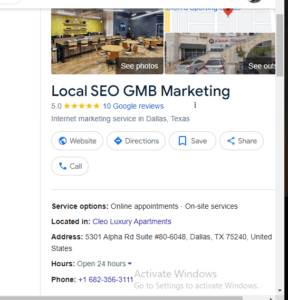For businesses in Dallas, standing out online is crucial for success, and incorporating Dallas Local SEO into your marketing strategy is key. Local SEO has become an essential component of digital marketing, helping businesses improve their visibility in search engine results and attract more customers. One powerful yet often overlooked tool within Dallas local SEO is structured data. In this blog post, we’ll explore how to implement structured data within your Dallas local SEO strategy to boost sales, along with a step-by-step guide on actions businesses can take to increase their online visibility.
What is Structured Data in Dallas Local SEO?
Structured data is a standardized format for providing information about a page and classifying the content on that page. It helps search engines understand the context of the information on your website, making it easier for them to display relevant results in search queries. By using structured data, you can enhance your website’s visibility in search results through rich snippets, which are detailed pieces of information that appear directly in search results.
For Dallas businesses, using Dallas Local SEO and structured data can be a game-changer, enabling you to highlight key information such as business hours, customer reviews, and location, which can significantly boost your Dallas local SEO efforts and, ultimately, your sales.

The Importance of Structured Data in Dallas Local SEO
Before diving into the implementation process, it’s crucial to understand why structured data is so important for local SEO:
- Enhanced Search Results: Structured data enables search engines like Google to display enhanced search results, such as rich snippets, which can include images, ratings, and other valuable information. This makes your listing more attractive and likely to be clicked on by users.
- Increased Click-Through Rates (CTR): With rich snippets, your search results stand out, increasing the likelihood that users will click on your listing over others. Higher CTRs often lead to better rankings, creating a positive feedback loop.
- Local Relevance: Structured data helps search engines understand your business’s location and relevance to local searches. This is particularly important for Dallas businesses looking to capture the attention of nearby customers.
- Voice Search Optimization: As voice search becomes more prevalent, structured data helps ensure that your business information is easily accessible to voice assistants like Google Assistant, Siri, and Alexa.
How to Implement Structured Data for Dallas Local SEO
Now that you understand the value of structured data, let’s dive into how to implement it effectively. Here’s a step-by-step guide to help you get started.
Step 1: Choose the Right Structured Data Markup
There are various types of structured data markup, but forDallas local SEO, you’ll want to focus on the following:
- Local Business: This schema is ideal for businesses looking to provide information about their location, hours, and services.
- Product: Use this schema to highlight specific products you offer, including pricing and availability.
- Review: Showcase customer reviews and ratings to build trust and attract more customers.
- Event: If your business hosts events, this schema can help highlight upcoming activities.
Step 2: Generate Structured Data Markup
Once you’ve selected the appropriate markup, you’ll need to generate the structured data. You can do this manually if you’re comfortable with coding, but there are also several tools available that can simplify the process:
- Google’s Structured Data Markup Helper: This tool allows you to highlight information on your website and generate the corresponding markup code.
- Schema Markup Generator by Merkle: This is another useful tool that provides an easy-to-use interface for creating various types of structured data markup.
After generating the markup, you’ll receive a piece of code that you’ll need to add to your website’s HTML.
Step 3: Add Structured Data to Your Website
With your markup code ready, the next step is to add it to your website. You can do this by:
- Editing the HTML Code: If you or your web developer are comfortable with HTML, you can directly add the structured data markup to the relevant sections of your website’s code.
- Using a Plugin: If you’re using a content management system (CMS) like WordPress, there are plugins available (e.g., Yoast SEO, Schema Pro) that allow you to add structured data without needing to edit the code manually. Make sure to place the structured data markup on the pages you want to optimize, such as your homepage, product pages, or contact page.

Step 4: Test Your Structured Data
Before going live, it’s crucial to test your structured data to ensure it’s implemented correctly. Google offers a Rich Results Test tool that allows you to check whether your structured data is valid and will generate rich results in search. Simply enter the URL of the page you’ve added structured data to, and the tool will provide feedback on any errors or issues.
Step 5: Monitor and Optimize
After implementing structured data, it’s essential to monitor your website’s performance and make adjustments as needed. Use tools like Google Search Console to track how your pages are performing in search results and whether your structured data is generating rich snippets. If you notice any issues, revisit your markup and make the necessary changes.
Additional Actions to Boost Online Visibility for Dallas Businesses
While structured data is a powerful tool, it’s just one piece of the Dallas local SEO puzzle. Here are some additional steps Dallas businesses can take to increase their online visibility and attract more customers.
1. Optimize Your Google My Business Listing
Google My Business (GMB) is a critical component of local SEO. Make sure your GMB listing is fully optimized by:
- Ensuring all your business information is accurate and up to date.
- Adding high-quality photos of your business.
- Encouraging satisfied customers to leave positive reviews.
- Regularly updating your GMB profile with posts, offers, and events.
A well-optimized GMB listing increases your chances of appearing in the local pack, which is the list of businesses that appear at the top of Google search results for local queries.

2. Build High-Quality Local Backlinks
Backlinks from reputable local websites can significantly boost your Dallas local SEO efforts. Reach out to local blogs, news outlets, and business directories to see if they’ll link to your website. You can also create valuable local content, such as guides or lists of local resources, that other websites will want to link to.
3. Optimize for Mobile For Dallas Local SEO
More people are searching for local businesses on their mobile devices than ever before. Ensure your website is mobile-friendly by:
- Using a responsive design that adapts to different screen sizes.
- Reducing load times by optimizing images and minimizing the use of heavy scripts.
- Simplifying navigation to make it easy for mobile users to find the information they need.
4. Use Local Keywords Strategically
Incorporate local keywords throughout your website to improve your chances of ranking for location-based searches. Use tools like Google Keyword Planner or Ahrefs to identify keywords that are relevant to your business and have a high search volume in Dallas.
Place these keywords in strategic locations, such as:
- Page titles and meta descriptions
- Headings and subheadings
- URL slugs
- Image alt text
5. Leverage Social Media
Social media platforms are powerful tools for increasing your online visibility. Share content that highlights your business’s unique offerings, engage with your followers, and encourage them to share your posts. Using local hashtags and geotagging your posts can also help you reach a broader local audience.

Boost Your Dallas Local SEO With Local SEO GMB Marketing
Boosting your Dallas local SEO is essential for standing out in search results and attracting more customers. One critical step in this process is implementing structured data, which helps your business appear more prominently online, driving traffic to your website and ultimately increasing sales. By following the step-by-step guide outlined in this post, you can effectively use structured data to enhance your online presence.
But that’s just the beginning. To truly elevate your Dallas Local SEO game, it’s important to optimize your Google My Business listing, build local backlinks, ensure your website is mobile-friendly, use local keywords, and leverage social media. These strategies work together to increase your online visibility and help your business thrive in a competitive market.
For businesses looking to implement structured data and take their Dallas Local SEO to the next level, partnering with professionals like Local SEO GMB Marketing is key. With our experience and expertise, we will help you achieve the visibility and success your business deserves.
Contact Us Today!
Name: Local SEO GMB Marketing
Address: 5301 Alph a Rd Suite #80-6048, Dallas, TX 75240,
United States
Phone: (682) 356-3111
webpage: www.localseogmbmarketing.com








